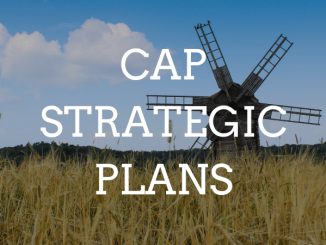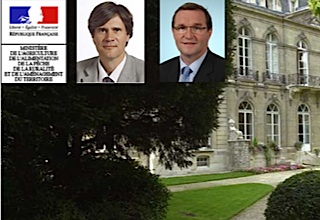Running since 1964, the Salon International de l’Agriculture in Paris is a microcosm of the knotted landscape around French agriculture. Visiting it for one day gives just a flavour of the much larger diversity, longer history, and deeper issues of this sector so important for French identities in France and Europe. We visited the 2023 opening day, curious to meet people, understand what is exhibited and what is not, and how. Here are our main takeaways. Photo reportage by Matteo Metta.
A mixed and concentrated agenda
We arrived early on the opening day of Salon d’Agriculture 2023. At the entrance, the chattering and vibes in the air were less spirited and exhilarating than what we saw later in the day, yet energising.
In France this exhibition is not just a key event for agricultural practitioners. The Salon’s pavilions are spaces open to everyone to talk seriously, but also to see animal breeds, drink, eat, dance, and in some cases also protest.
The opening day is often the political arena for politicians to show their proximity to French agricultural and rural concerns, as well as broader issues such as pensions, international affairs, purchasing power, food safety, etc.
If visitors do not want to follow the French President’s usual packed marathon around the Salon, there is always a way to jump to the next pavilion. Or to explore one of the many existing alternatives. For instance, FADEAR, Confederation Paysanne and their friends are organising Salon à la Ferme, this year for the third time.
At Salon à la Ferme, more than 200 farms open their gates to welcome citizens from all over France and beyond. (See our report from last year’s event here.) This is a way to de-centralise, re-orient, territorialise and clearly sharpen the political positions of a otherwise highly concentrated exhibition. Even if the Salon International in Paris attempts to give equal visibility to all, in my view, it finally reflects the clear pitfalls, biases, and contradicting agendas, slogans, and powers unbalances in French agri-food and rural landscape.
Another alternative event takes place this weekend on the other side of Paris. The Salon des Agricultrices in Pantin spotlights the issues and contributions of women farmers in France, and this year the Caribbean.
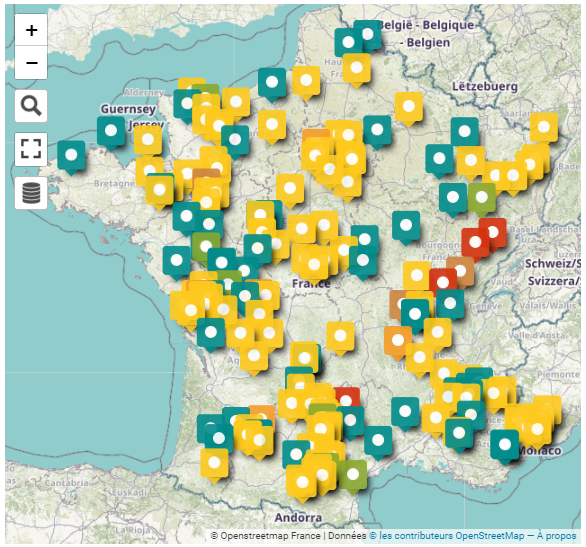
Interactive map of the initiatives participating in Salon à la Ferme in France. Source: La Confédération Paysanne
French agri-tech: crumbling or thriving?
The 2023 edition places French agri-tech in a slightly more pivotal position of the Salon compared to the last editions, though some of the staff at #CoFarming argued that this slight outlet change reflects mainly a physical rather than political move. In a continuum with the pet projects of his predecessor, the current French Minister of Agriculture seems to give less of an operative and political boost to agri-tech start-ups. Maybe because he has fewer personal ties with the business around digital carbon markets.
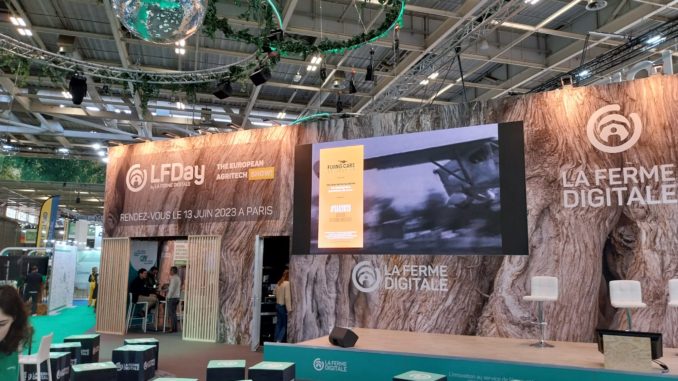
Boosted in 2021 with a report outlining the government’s intentions to digitalise French agriculture and make it a global leader, the French agri-tech today walks the path marked by former Minister of Agriculture Julien Denormandie who wanted to bring the finance and start-up worlds “closer” to agriculture. Of course, there have been start-ups and projects that are genuinely closer to the true needs and conditions of French farmers. But have a talk or walk in Hall 4 with a critical prism to understand firstly the techno-fix biases and terminological capture of French agri-tech, but also the inherent business models, risks, challenges, opportunities, and financial interests around the French digital agriculture.
Though “La Ferme Digitale” and #CoFarming consider themselves as two complementary associations in continuum with the modernist views that French agricultural matters can only benefit from increasing platformisation and digitalisation, they have also some subtle differences in their philosophy, ethics, sponsors, and approaches. Moreover, they share common challenges too.
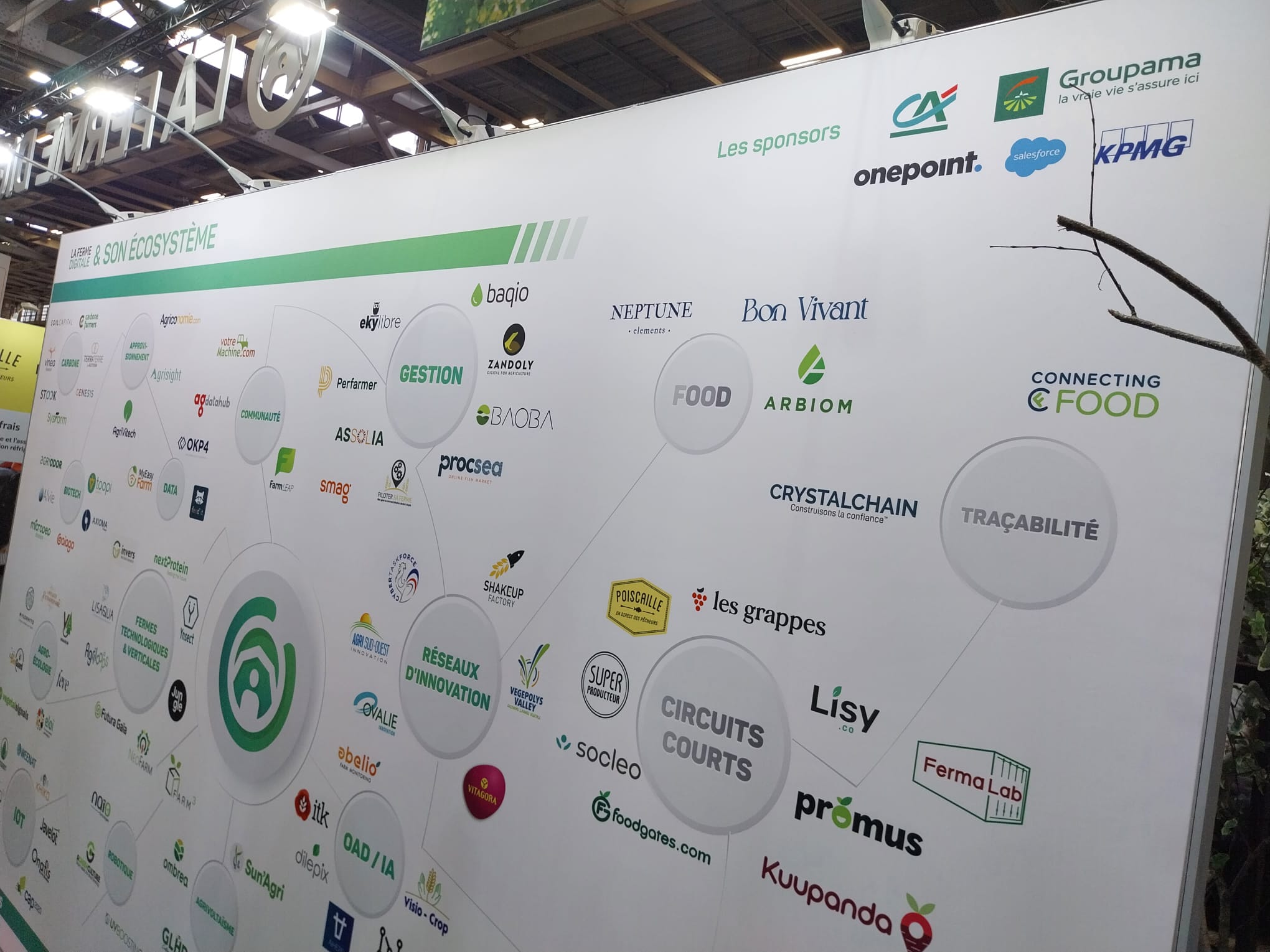
A staff member of #CoFarming explained: “After our first experiences, we learned that only a few French digital start-ups manage to survive and remain viable in agriculture and rural areas. This is especially true for start-ups in the collaborative or sharing economy. Agriculture is not always an attractive sector because it has slower cash flows that depend on climate and biological cycles, and much smaller turnover than the rest of the economy. Moreover, compared to other spheres of life and economy, transactions in the farming and rural communities are more personal and long-lasting. This is different from the type and volume of transactions that occur in accommodation, mobility, e-commerce platforms.”
He added: “Once they use a platform, let’s say a website to know where to rent a machine or buy food locally, farmers and rural dwellers start to know very well each other and circumvent the platform. When the commission fees are bypassed, we cannot pay back the services we provide, but especially the initial investments we made for creating these digital systems and provide trainings, capacity building, and the advertising that is required to plug these technologies into the very tight social rules and everyday reality of French agriculture and rural rules. Furthemore, the French market segment and money potential for digital platforms is ridiculous compared to the size and what is happening in the USA. So, either we must expand our business target to the European market or basically we cannot alone compete on an international basis just with a French market.”
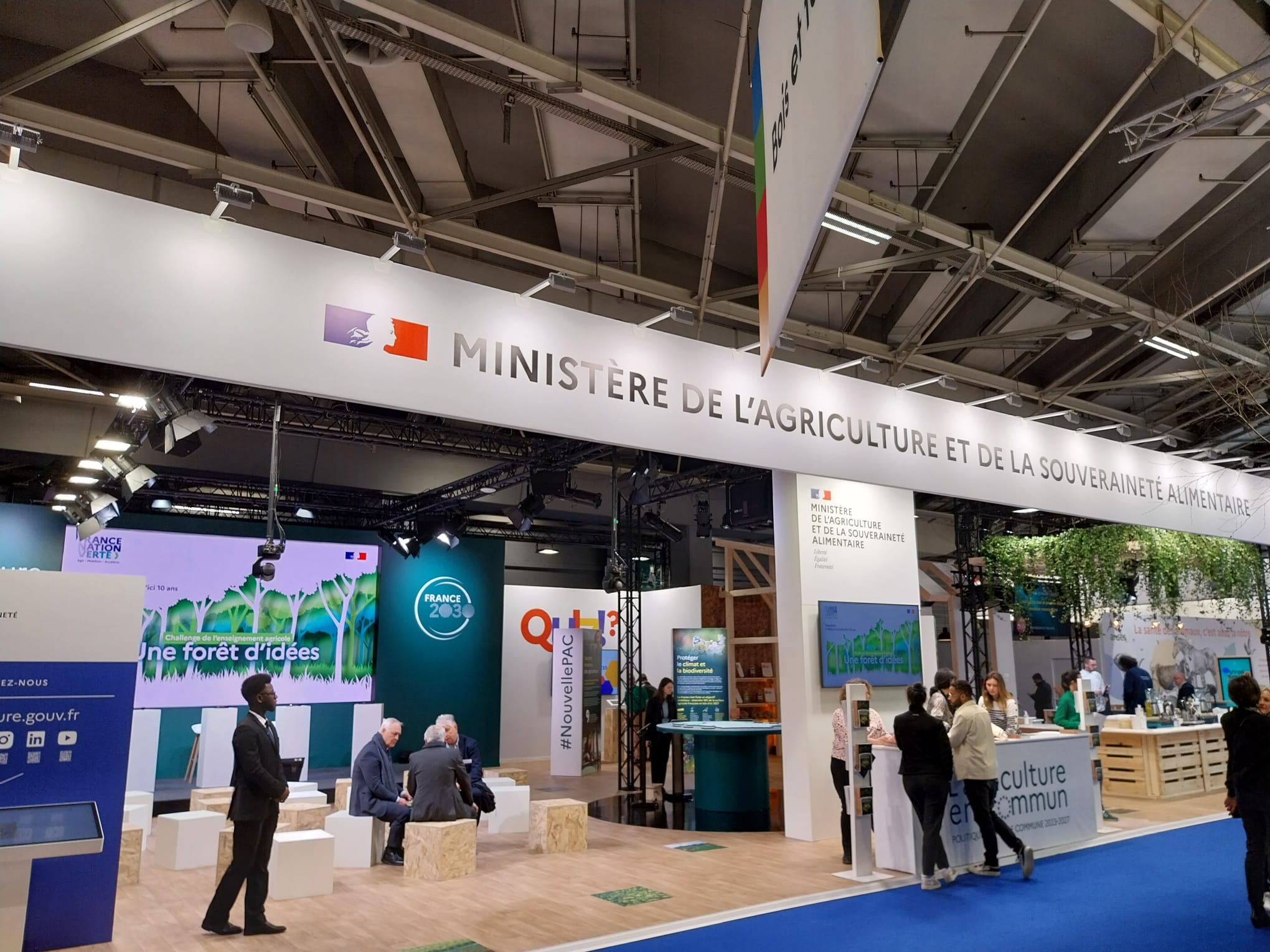
New CAP: quiz, debates, what is the substance?
At the stand of the French Ministry of Agriculture and Food Sovereignty, the post-2022 CAP reigns. A touchscreen quiz, speeches, and a new national stakeholder consultation process on the Pact and Framework Law on the Future of Agriculture (Pacte et loi d’orientation et d’avenir agricoles) try to assert the role of the Common Agricultural Policy in dealing with today’s challenges, from climate and food security to employment and generational renewal. Big claims of a greener, fairer, more transparent CAP sound promising. Such a pity that they remain claims in most of the cases.
As I have observed in other countries too, the French mainstream agri-food establishment sustains its political power by creating the narrative of the “EU as the devil”, when actually France is a big player of the CAP decision making process at EU level. Moreover, France is already in the position to make at least a few substantial changes at national level, that a large spectrum of the farming community in France could (more or less) agree on, such as effectively implementing the EGalim 2 law, introducing capping of the largest corporates benefiting from direct payments (excluding GAECs and other cooperatives under transparency), strengthening the rules and enforcement institutions to avoid land grabbing, up to matters that can be dealt in Brussels, such as opposing free trade agreements that favour the cheap import of feed for intensive farming, defending organic farming from greenwashing, and more.
Yet, these and other topics related to CAP have an international dimension and still contrasted positions within France. One would imagine that in this complex arena, things would get stuck in the mud, whereas actually decisions are moving more towards the current dominant model. And as hard as it tried to make the new CAP accessible to most, I believe this stand at the Salon in Paris avoided entering the merits of the last CAP reform by projecting the visitors’ attention to the quiz, or to “the future, to the next debate”, which is a typical tactic currently going on also in EU policy-making. Or regrettably, it falls short in acknowledging the system failures and shows only one side of the story.
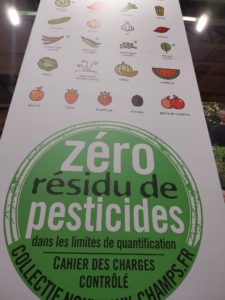
New food labels on the horizon: where is the holistic approach?
For a breath of fresh air, we went to visit Agri’Expo in Hall 2.2. Here we met nice young people at the stand for the market-led label “Zéro Résidu de Pesticides” for agri-food products. This label is neither new, not exclusively present in France. Similar labels are popping up also in Italy, Spain, or Belgium.
For many years, organic certified farmers have been concerned about the threats posed by the conventional system in terms of transmitting GMO seeds or pesticide residues from nearby farmers. Organic farmers fail to believe that a farm becomes organic just from one year to another, without a conversion period to readapt the whole farm. The Zéro Résidu de Pesticides completely shoots down this concern. Basta. Let’s talk about results.
Although it presents itself as innovative, I found the concept not so original because our market, society and policies have long co-opted the ideology of “results-based”, “performance oriented”, and all sorts of jargon to basically homogenise the differences in the farming styles, distract attention from the process and holistic qualities, and focus only on what someone believes should be the key essence of something, be it an experience, a policy, a service, a product, or whatever. No matter what happens in the field, the label – full of green shades – certifies the presence or absence of pesticide residues. As if public authorities were not already responsible for doing so. As if today’s consumers needed another label.
So we were curious to learn more about its complementarity or additionality with the organic label, the reasoning behind the label, the conditions and audit system to be certified, and also the harmonisation with other similar labels in other EU Member States. If one is interested in a new wave of Nutri-Score debates, different farming or food industry-led strategies to circumvent the organic label’s primacy, and capture food premium prices, then this is the stand to visit. Just take our advice warning: Don’t ask too many questions about the specifications (i.e. cahier des charges). Stick to infographics and numbers.
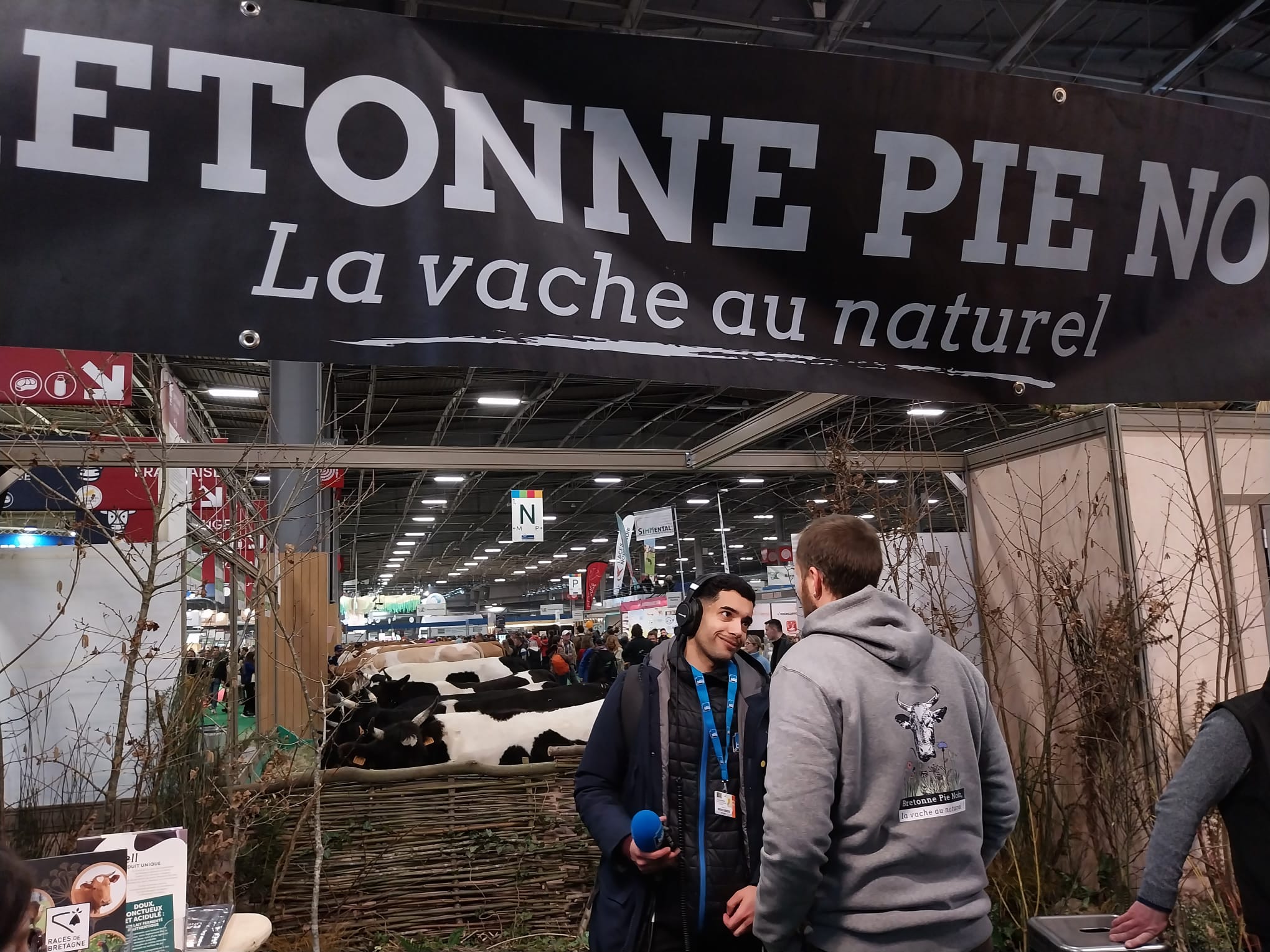
A new PDO for Gwell
We could not leave the Salon without visiting Hall 1 Ovalie. In this large pavilion it is possible to see a small portion of the decreasing animal diversity in France. Here we met L’Union Bretonne Pie Noir (UBPN), the association of Breton Pie Noir cow breeders. Its mission is multifold, from managing the genetic protection plan, animating the network of breeders, manage aids, ensure the communication necessary for the promotion of this heritage breed, its breeding systems and its products.
In 2022, the association submitted its formal request to the French Ministry of Agriculture and Food Sovereignty to register Gwell under the Protected Designation of Origin. For those who have not tasted it yet, Gwell is a traditional fermented cheese with a similar consistency of a yogurt, but with a much richer flavours and taste. We sampled this delicacy and learned about the pressure to rear the Bretonne Pie Noir dairy cow, a local heritage breed in danger of extinction within the current productivist and capitalist economy. We wish all the success for the recognition of this territorial and historical prize of the French culinary and farming tradition.
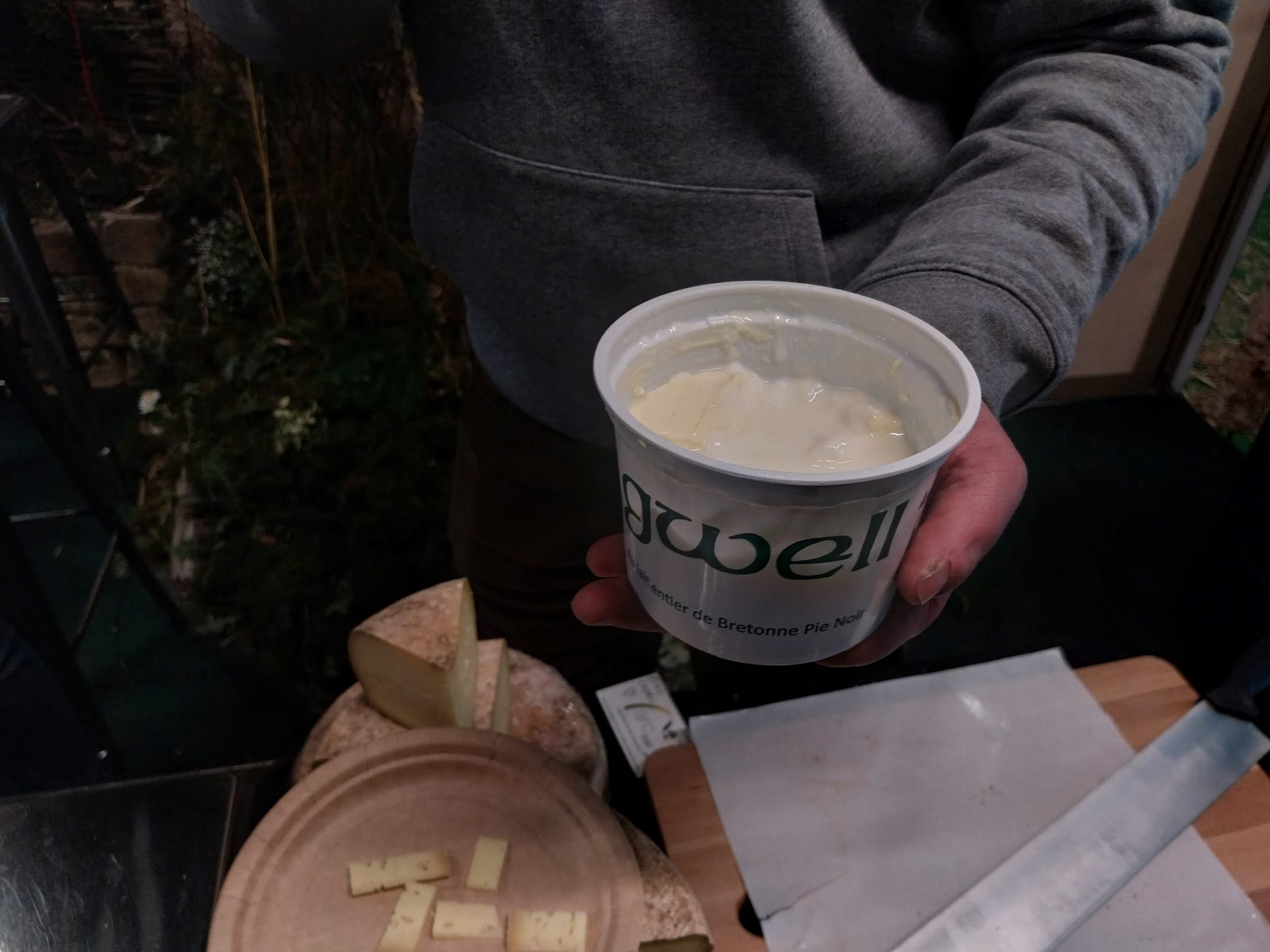
Passionate people and initiatives
We could share many other insights and interesting initiatives that you can learn from the Salon de l’Agriculture, which we recommend you visit if you can. Here we met some members of French Young Farmers association to hear their views about glyphosate, capping of large beneficiaries of direct payments, and the EGalim 2 law that purports to improve incomes for farmers.
We spoke to Gîtes de France in a very loud wine-themed pavilion. We tried to understand the challenge of rural tourism and agritourism in a digital economy dominated by a few large booking platforms. Besides the sharp difference in terms of quality standards and commission fees applied on each booking transaction, they explained to us the challenge of French associations in raising the rural experience standards and competing with international corporate platforms that declare their profits in tax-haven countries.
Finally, we spoke to ÖKOTOP.com, a non-profit association aiming to promote alternative livestock-based methods for landscape management and biodiversity protection. With Damien Hédin of the French Federation of Ecograzing (Fédération Française d’écopâturage® et d’écopastoralisme®), we discussed the multi-actor landscape in France dominated by two players (green sheep and eco-mouton), the use of digital technologies and the interlink with CAP. Very fruitful and honest discussions. Thank you to everyone we met at the Salon.
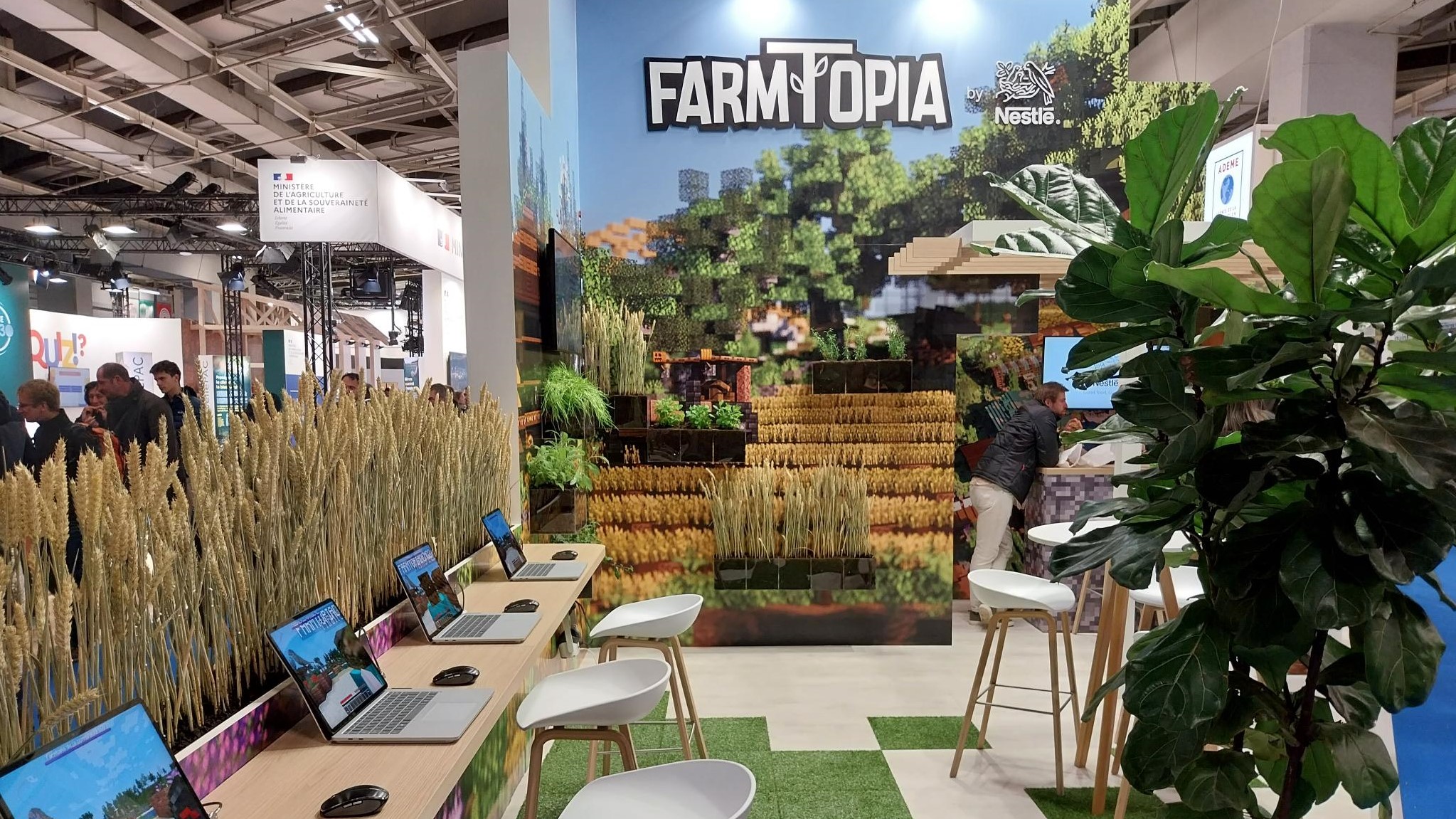
Disneyland of corporate greenwashing
We could not document all of the attempts of corporate greenwashing at the Salon, which unfortunately reflect the reality of the rest of the economy in France and elsewhere. Here the pictures speak for themselves.
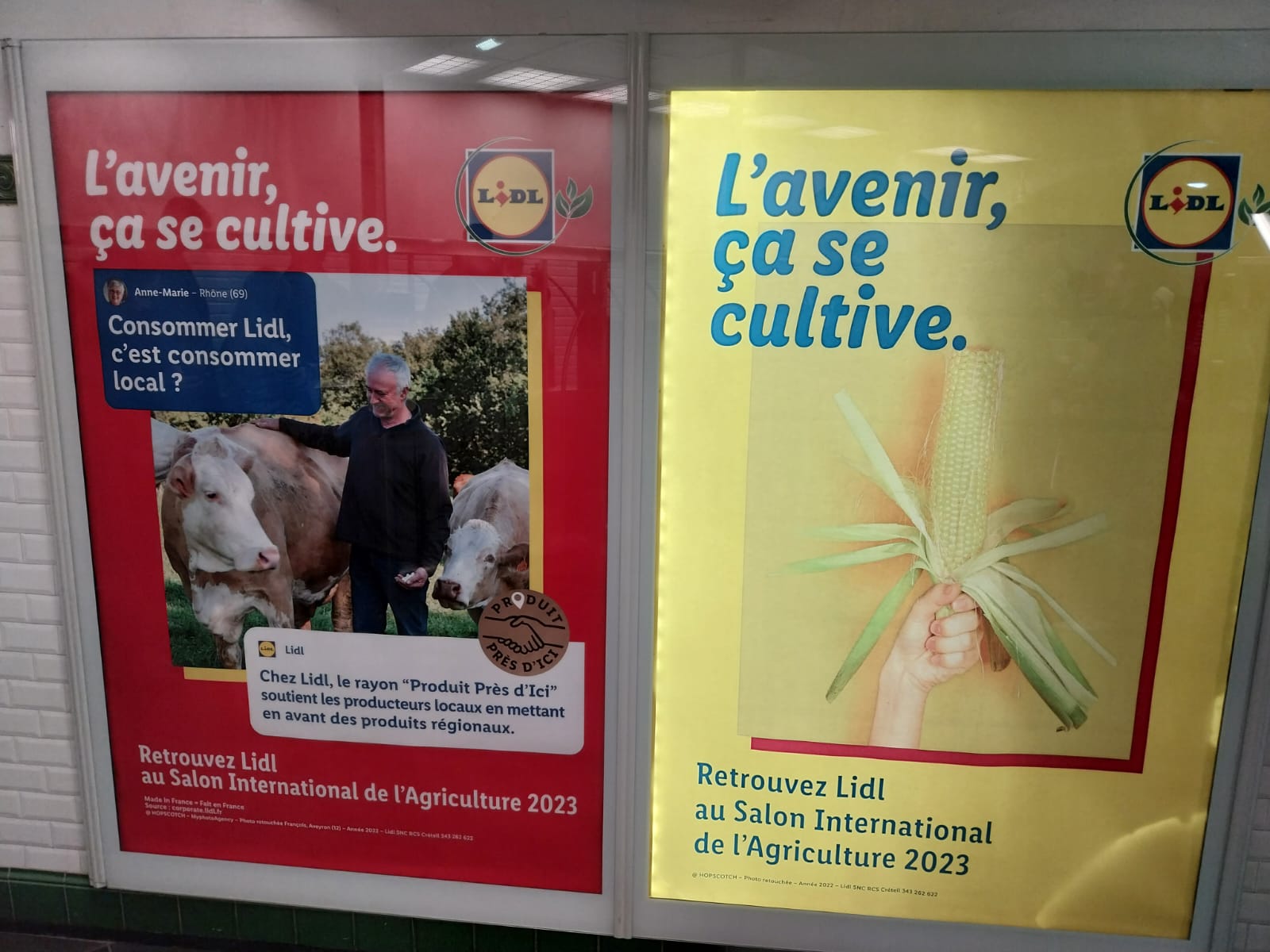
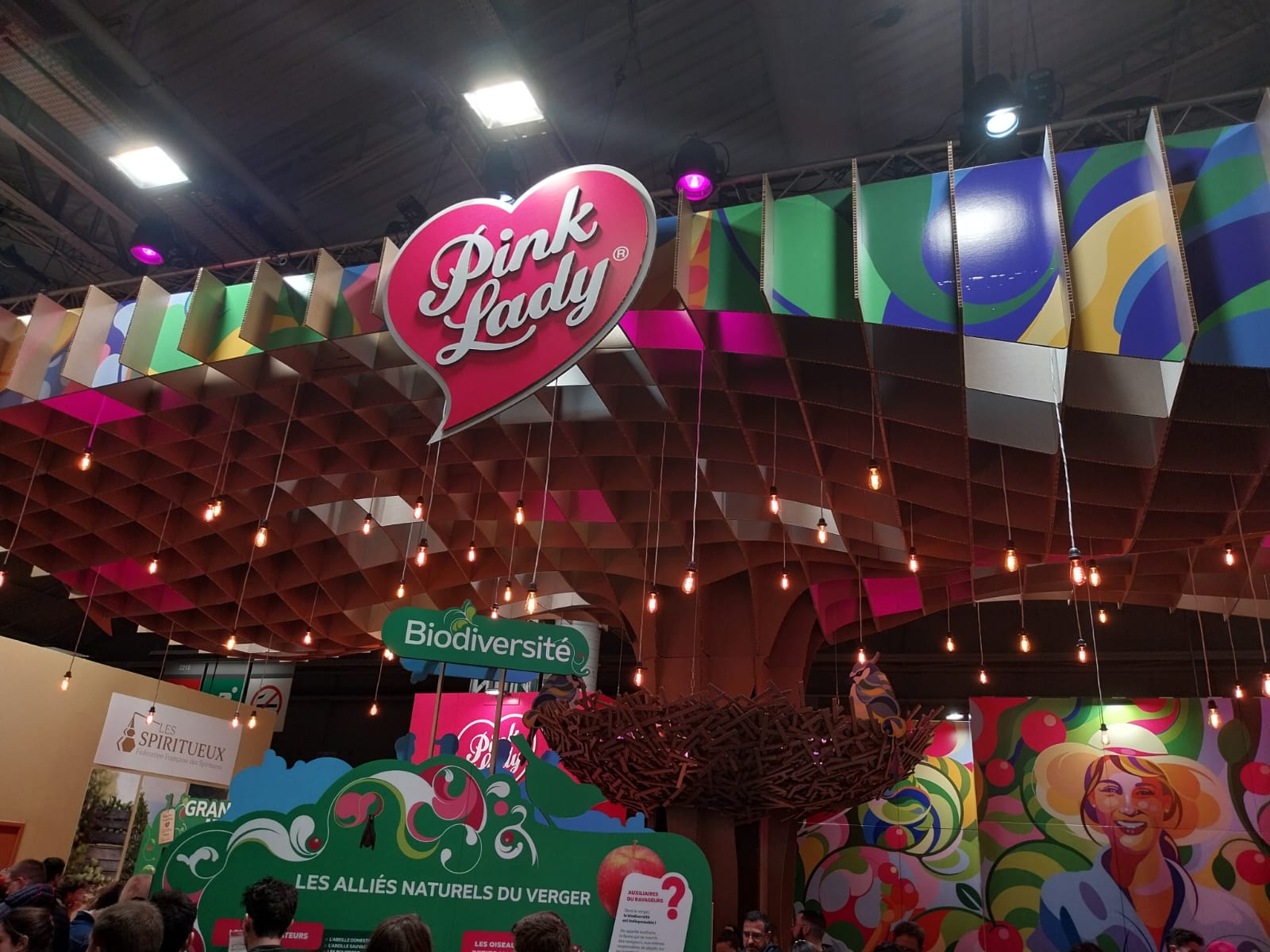
More on Agri-Food
“CAP is an Aberration in terms of Climate & Environmental Impact of Ag”
New ARC Report | Carbon Farming – Stakes, Issues and Alternatives
Meet the Movement Linking Civil Society with Philanthropy for Food System Transformation
A-ction, R-esilience, C-ritical Mass – Hannes Lorenzen’s Letter to 2023
Oxford Real Farming Conference 2023 | Agroecology Movement Gathers for Hope and Action
More on France
Cultivating The Future Together – ARC’s Rural Resilience Gathering in France
Rural Realities | Succession – Passing It (All) On To The Next Generation
Organic and Biodynamic Viticulture: Adapting the Vine in a Changing Climate
France | Meet The Farmer-Bakers Proving Their Skills – part 2
Graduation then Desertion – French Ag Students Opting for a Different Path




